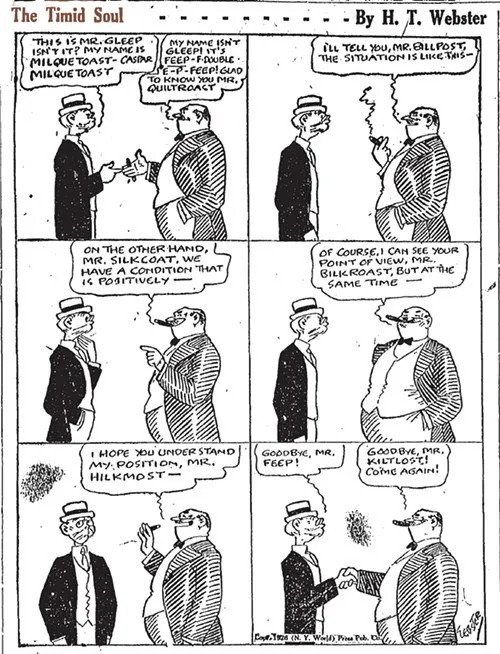A milquetoast is a person who’s meek or timid, lacks character or is ineffective. A wimp or a wuss, if you will. I first heard this term in the PS4 game ‘Bloodborne’ where it’s one of the starting classes. If you’re not a gamer then you might not have come across it, although I did also hear it in ‘American Horror Story’ (‘Delicate’, in case you’re wondering) the other day.
Apparently the term is much more common in American English than it is over here. That’s probably because ‘milquetoast’ comes from an American comic strip called ‘The Timid Soul’, which was published in 1924. Created by American cartoonist Harold Tucker (HT) Webster, the comic strip featured a character called Caspar Milquetoast, who was himself named after the American dish milk toast, which is, you’ve guessed it, toasted bread in warm milk. Why America, why?
Webster described Caspar Milquetoast as ‘the man who speaks softly and gets hit with a big stick’. Aw. He’s named after milk toast because it’s light and easy to digest, and good for people with weak stomachs. Caspar was featured in books, films, radio programmes and vaudeville acts, and, according to a 1945 article in ‘Time’ magazine, was as famous as Tom Sawyer, and even more so than Don Quixote. Wow.
HT Webster drew more that 16,000 single panel cartoons in his lifetime. In 1927 a severe case of arthritis meant he could no longer draw with his right hand – so he taught himself to do that with his left, and his career carried on for another 25 years after that. I can’t even paint the nails on my right hand without making a hash of it, so kudos to Mr Webster.
(Credit: H. T. Webster, public domain, via Wikimedia Commons)



